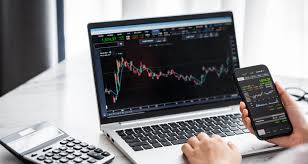Mobile technology is changing how Nigerians interact with the financial market, especially in the fast-growing area of foreign exchange trading, also known as forex. With a population of over 220 million and one of Africa’s strongest fintech sectors, Nigeria has become one of the most active countries for forex trading through mobile apps. From Lagos to Port Harcourt, down to smaller towns, more Nigerians are now using smartphones to access global currency markets.
Many first-time traders in Nigeria begin their forex journey with mobile apps. These apps are easy to use, consume little internet data, and are available for quick download. Most importantly, they come with user-friendly features that reduce the complexity of forex trading. But these days, simply having access to the market is not enough. What really makes a difference is the ability to understand and use in-app analytics. These are smart tools inside trading apps that help users interpret figures and graphs in real time, giving them an edge in the fast-moving forex world.
Forex trading is a global and highly volatile activity. For Nigerian traders, it becomes even more sensitive due to factors like naira fluctuations, Central Bank of Nigeria (CBN) circulars, political news, and oil prices. With in-app analytics such as real-time charts, live price updates, and AI alerts, traders can quickly adjust their strategies. For instance, someone trading in Abuja during a power outage can still get the latest price movements using a mobile app, instead of relying on delayed web pages.
Modern trading apps now show useful information like bid and ask spreads, open positions, and margin levels in colourful formats. This makes it easier for even a beginner to trade with as little as $100 and still understand what is going on. The simplicity of these apps encourages more Nigerians to join the forex space without fear of getting confused.
Some of the most important in-app analytics that Nigerian traders should pay attention to include volatility meters, which show how much a currency pair has moved within a specific time. This is helpful especially during big news events like U.S. job data or a sudden CBN policy update. Also, sentiment indicators reveal how many people are buying or selling a particular currency pair, which can give clues about possible price reversals.
Economic calendar widgets are another vital feature. They tell traders when key events are expected to happen, such as inflation announcements, interest rate decisions or budget releases. Spread trackers are also helpful because they show when trading costs go up, especially during holidays or just before major financial markets close.
These tools help traders react quickly. For example, if the price of crude oil rises or a new CBN directive is released, forex pairs like USD/NGN can move sharply. Using live heat maps and trend indicators, traders can make smarter decisions and avoid losses.
Besides helping with live trades, these apps also assist traders to review their past activities. Features like profit and loss summaries, trade journals, and downloadable reports allow users to track what worked and what did not. For example, a trader might discover that most of his winning trades happen during the London session and can focus his trading around that time.
To get the best results from mobile analytics, traders should set up alerts using the Average True Range (ATR) to know when the market becomes highly volatile. They should also write short notes inside the app to explain the reason behind each trade. Reviewing trade history weekly and adjusting position sizes based on naira inflation and banking fees can also help in managing risks better.
In Nigeria, forex trading is regulated by the CBN and Securities and Exchange Commission (SEC). Traders are advised to use apps that offer negative balance protection, segregate client funds, and provide downloadable tax reports for the Federal Inland Revenue Service (FIRS), since profits from forex trading are taxable.
Looking ahead, the future of mobile forex trading in Nigeria is promising. As internet coverage expands to states like Zamfara and Cross River, mobile analytics will become even more advanced. Some Nigerian fintech startups are already developing apps that use artificial intelligence (AI) to give trade advice in Pidgin English and Yoruba, making forex education more accessible.
Imagine getting a push notification to close a GBP/NGN trade because the current trend looks like what happened during the Brexit crisis—this type of smart advice will soon become a reality. With better technology, Nigerian forex traders will no longer be left behind.
Mobile apps have now become powerful trading tools. Whether you are caught in Lagos traffic or relaxing in an Enugu café, your phone can serve as a full trading terminal with live charts, risk alerts, and news feeds. For Nigeria’s fast-growing number of forex traders, success will depend not just on quick fingers, but on the smart use of in-app analytics. With better tools, clear strategies, and risk management, traders can grow their portfolios confidently and sustainably.
